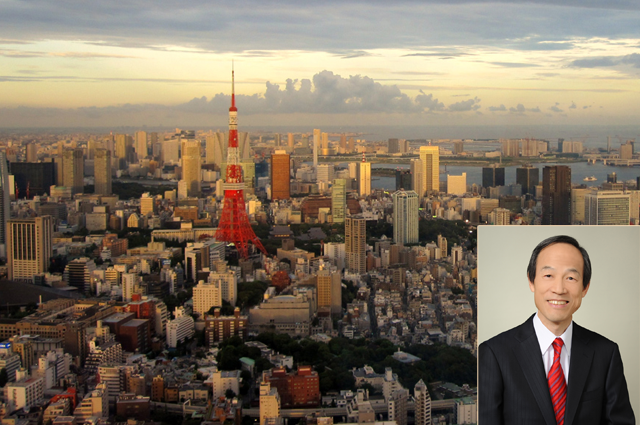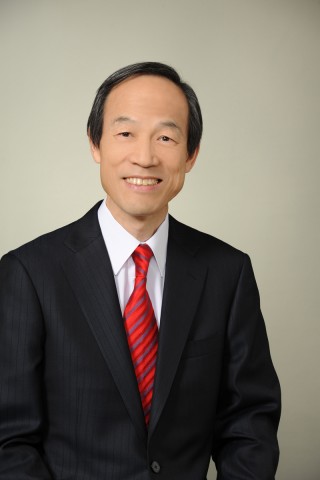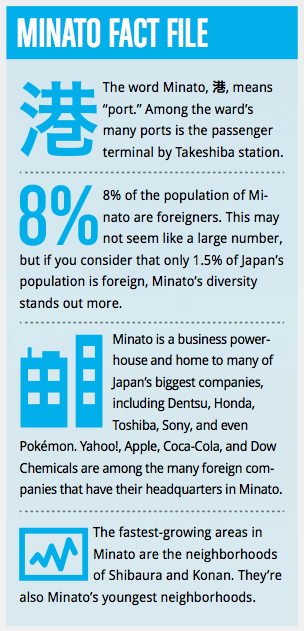With a collection of neighborhoods that includes the harbor side areas of Shibaura, the offices and parks of Akasaka, and the upscale cosmopolitan hubs of Azabu-Juban and Shirokanedai, Minato Ward boasts a wide variety of urban zones in a small area of land. Dozens of Japan’s top companies have their headquarters there. It’s also the ward with the highest proportion of foreign residents: the citizens of 130 different nations make their home in Minato, and the embassies of 82 different nations can be found in this “little UN.”
By Alec Jordan
With such a diverse set of concerns and groups of people—Minato’s official population is 235,000, and the daytime population swells to more than a million during working hours—is no easy task. But it’s one that Masaaki Takei, the kucho of Minato-ku, has handled with efficiency and a low-key attitude during his 10-year tenure. Tokyo Weekender spoke with Takei about the challenges of administering Tokyo’s most diverse ward, his greatest successes in office, and his opinions about the campaign financing scandal that forced Governor Naoki Inose’s resignation.
The first thing that Takei cleared up was the specific role of the kucho, and how the wards and the greater metropolis of Tokyo are related. As Takei explained, “if you think about the role of the kucho a little bit like you’d think of the mayor, that would be about right.” He explains that the relationship of Tokyo to its wards is much like that of a prefecture to its cities; however, the wards have a stronger financial link to the Tokyo metropolitan area. For example, emergency services and other municipal services, such as water and power, are provided by Tokyo, but funding for trash collection, schools, and many other services are funded by the wards themselves.
Ensuring that Minato’s foreign residents (the most populous are, in order, Korean, American, and Chinese) can take an active part in the everyday life of the ward is a prominent part of Takei’s job. To keep foreign residents informed about the services they can use daily, the ward provides a wide variety of information about daily life in Minato in a variety of different forms—some of the more innovative systems are an email information service that is available in Korean, English, and Chinese at [email protected], and a Japanese-English bilingual phone service at 03-5472-3710.
An issue that is frequently on the minds of foreigners is their inability to vote in elections, and this will not be something that will change any time soon. However, while Minato’s foreign citizens cannot vote, they are able to take part in general assemblies and they can give their opinion in many different forums, both formal and informal. In fact, this is something that Takei hopes will increase: “I want to hear what people want,” Takei says. “Our diversity is really an advantage that the ward has, because it is a source of great new ideas and perspectives that can make Minato a better place to live.”
Takei is not given to boasting, but he does take pride in one of his earliest accomplishments, and it was one that met a lot of early resistance. In a move that gave branch offices more power to control their own affairs, he pushed for decentralization that gave the individual neighborhoods more autonomy. As he explains, this was a change that he wanted to implement before he took office. “My election pledge was decentralization and I was able to implement this pledge 18 months after taking office.” Takei said that his plan met plenty of friction: “my critics said that decentralization would bring about inefficiency and discord, and a loss of expertise. I was happy to be able to prove them wrong.” Decentralization led to a streamlining of many municipal processes, and gave more power to the directors of the branch offices to address the specific needs of their communities. Currently, the areas of Shiba, Azabu, Akasaka, Takanawa and Shibaura-konan are using this streamlined process, and it has been a success over the past eight years.
When we asked him about the crisis that led to Naoki Inose’s resignation as governor of Tokyo, Takei spoke about his deep disappointment with the situation. “It’s a shock to have a person in the top position in Tokyo have to step down like that. It does not do an honor to the city.” He also didn’t accept Inose’s rationale that he needed the money to run his campaign: “According to the law, there is a fixed amount that you are allowed to use. Going beyond that amount simply isn’t permitted. You can receive donations, but there is always an upper limit. The whole thing makes me wonder if anyone really needs that much money.”
It was clear in our conversation that Takei considers himself a public servant, in the best sense of the word: for him, the people truly do come first, and this was one of the reasons that the Inose scandal bothered him as it did. “I am always thinking from the point of people who live and work in Minato-ku, and for the people who receive our services,” he says. Unlike the big-time personalities of a Naoki Inose or a Shintaro Ishihara, the “Mayor of Minato” doesn’t need to be the center of attention. He keeps his focus on the task of keeping Tokyo’s most international ward running smoothly, as it prepares to play its part in hosting the world in 2020.











